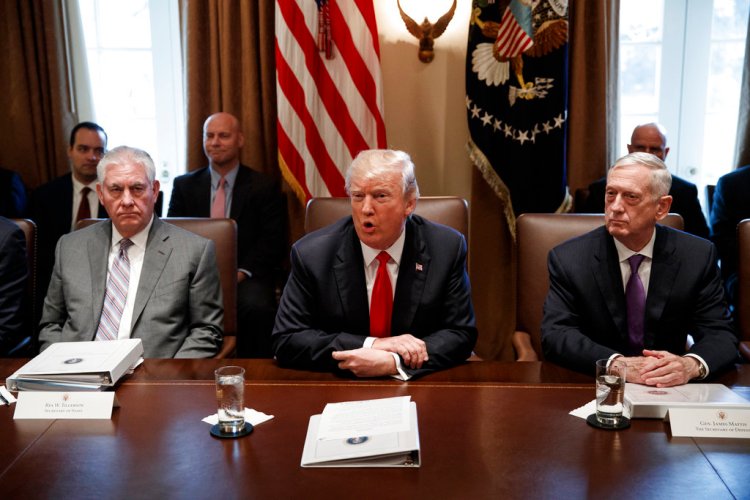President Trump on Friday kept alive the Iran nuclear deal he detests by waiving sanctions for the third time, but said he will not repeat the reprieve unless the agreement is amended to permanently block a potential pathway to build nuclear weapons.
In conjunction with the sanctions waivers, the Treasury Department placed sanctions on 14 people and entitities for offenses unrelated to Iran’s nuclear industry. Theyconcern human rights abuses and censorship in Iran and its arming of groups throughut the region.
Trump’s decision avoided placing the United States immediately in violation of the commitments it made in the 2015 deal. But he signaled his willingness to withdraw from the deal in ta few months unless changes are made.
“The president makes clear this is the last such waiver he will issue,” said a senior administration official, speaking on condition of anonymity under rules for briefing reporters. “He intends to work with our European partners for a follow-on agreement.”
Among the changes Trump demands is timely inspections of all sites requested by inspectors for the International Atomic Energy Agency, and an end to expiration dates sometimes called “sunset provisions” so the United States can snap back sanctions forever if Iran is ever found to be cheating.
Trump also is demanding a breakout time of more than one year. The 2015 deal extended the breakout time — how long it takes to amass enough fissile material to construct one nuclear bomb — from two months to one year.
Ahead of the White House decision, Iranian officials warned that a U.S. withdrawal from the deal would spell its doom.
On Twitter, Foreign Minister Mohammad Javad Zarif said Thursday that he made clear in meetings with European diplomats this week that “Iran’s continued compliance [is] conditioned on full compliance by the US.”
Earlier this week, officials from Iran’s Atomic Energy Organization threatened to both boost uranium enrichment and cease cooperation with the International Atomic Energy Agency if Trump violated the deal. The IAEA, a United Nations watchdog, monitors Iran’s compliance with the agreement.
Iran’s nuclear chief, Ali Akbar Salehi, reportedly spoke with IAEA head Yukiya Amano on the phone on Monday, Iran’s state-run IRNA news agency reported.
According to IRNA, Salehi told Amano that if the United States fails to honor its commitments under the deal, “Iran will adopt measures that can affect the current trend of Iran’s cooperation with the agency.”
No other country requires its leaders to periodically justify the deal the way the U.S. president must, but Congress enacted a law with the requirement out of deep and abiding mistrust of Iran’s intentions.
The president has been very clear, okay, that many aspects of the Iran deal need to be changed; that there are many activities outside of the Iran deal, whether it be ballistic missiles, whether it be other issues, that we will continue to sanction that are outside the JCPOA,” Treasury Secretary Steven Mnuchin said Thursday, using the acronym for the deal’s formal name, the Joint Comprehensive Plan of Action.
“Human rights violations. We couldn’t be more focused,” he said. “We have as many sanctions on Iran today as we have on any other country in the process. And we’ll continue to look at things.”
White House press secretary Sarah Huckabee Sanders said that Trump “still strongly believes this was one of the worst deals of all time.”
“One of the single greatest flaws is that its restrictions leave Iran free in the future to openly develop their nuclear program, and rapidly achieve a nuclear weapons breakout capability. Obviously we see big problems with that,” Sanders said. “The administration is continuing to work with Congress and with our allies to address those flaws.”
Erin Cunningham in Istanbul contributed to this article.
Send questions/comments to the editors.



Comments are no longer available on this story